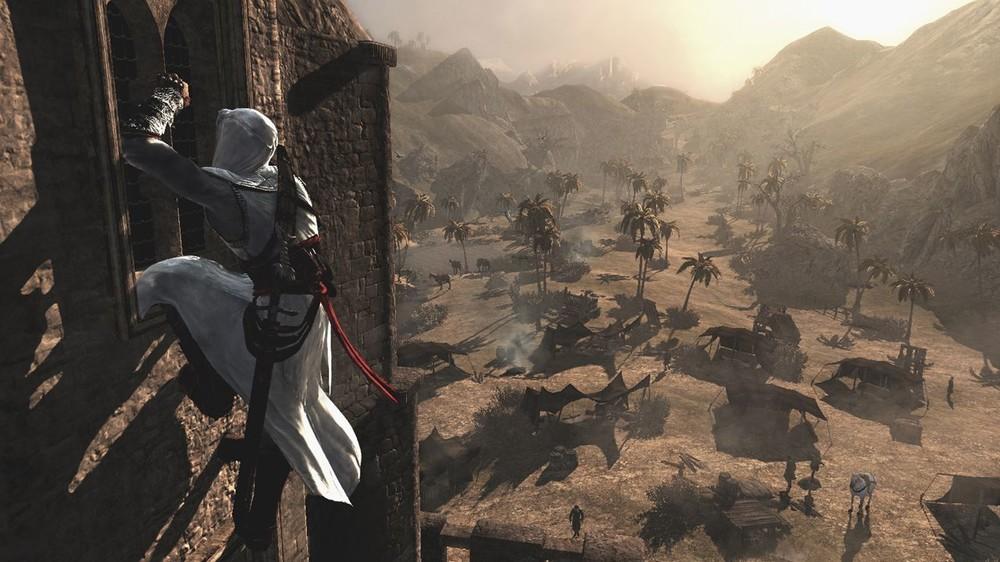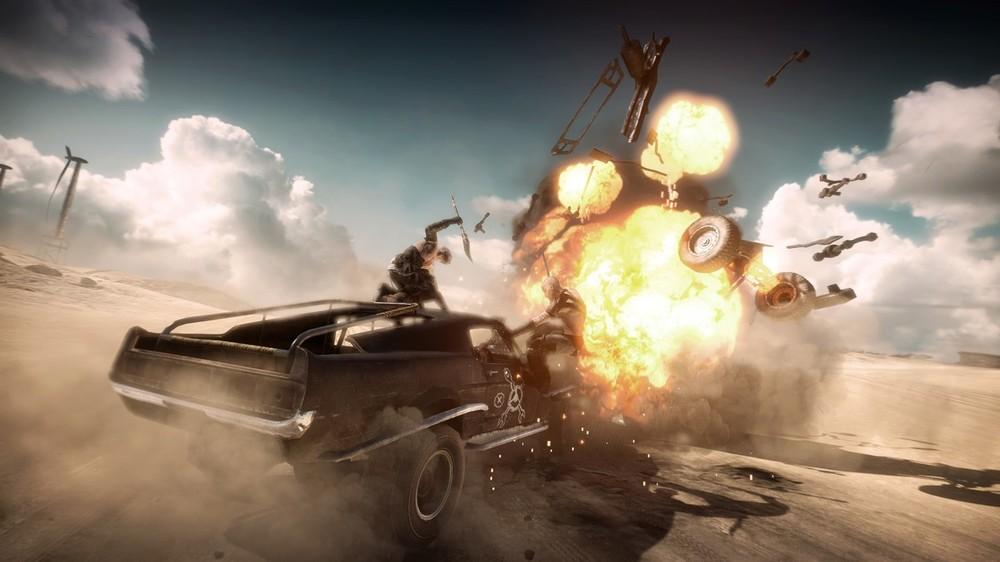
A screenshot from the original ‘Assassin’s Creed’
This article is taken from VICE magazine’s UK edition, volume 22, issue 9
Having been an annual fixture on release schedules since 2007, the announcement of any new Assassin’s Creed game can only stir diminished enthusiasm. Yes, Ubisoft’s series has been through changes, its historical period setting shifting from the time of the Third Crusade in the original to the Victorian London of Syndicate, released in late October, via adventures around the pirates-infested Caribbean of the 18th century in Black Flag and 16th century China in the Chronicles spin-offs. But the way the games play has remained as good as the same: sneak here, kill him, climb up that really tall thing over there to unlock more places to go and people to murder.
Videos by VICE
I’ve played a sliver of Syndicate, not enough for a conclusive verdict, but I wasn’t wholly sold on its newly introduced elements bringing significant depth to the overall experience. Your character, a gangster sort spilling Cockney clichés like a Catchphrase contestant on an episode where Mr Chips is played by Danny Dyer, has a rope launcher amongst their gadgets, allowing swift scaling of the English capital’s grime-coated buildings. But while it allows for increased traversal options, Batman’s grapnel gun as found and felt in this year’s Arkham Knight was a superior take on upwards momentum, and a lot more fun to use. And that’s really what Assassin’s Creed’s been lacking since the cannons-and-balls sea battles of Black Flag: fun.
Which is why the most interesting news to come out of the Creed camp has nothing to do with a forthcoming video game. At the end of August, a fan account for actor Michael Fassbender tweeted a photograph of him as a hooded assassin, a stylistic cousin of the first game’s Altaïr. It represented the first palpable piece of promotion for the Assassin’s Creed movie, provisionally due for release around Christmas 2016. The film isn’t a straight adaptation of one or two games; rather, it’s telling its own story, proceedings based on established lore. Namely: ancestral memories of any given individual can be experienced today using a device called the Animus, and one mega corporation, Abstergo, is using this technology to benefit the modern-day Knights Templar.
Or something like that. I’ll confess: amid all the stabbing and the sprinting and the hiding of the first few games, it was easy to lose track of precisely why I was being asked to switch between controlling a professional killer in the past and a barman called Desmond in the present, who spent most of his time in a horizontal position unsuccessfully flirting with Kristen Bell before having his DNA ransacked for secrets. The film will, it’s hoped, take what is actually a fairly engaging premise – memories of several generations ago are locked tight within a person’s genetic make-up, and with the right poking and prodding they can be recovered – and concentrate hundreds of hours of game exposition into a neat 90 minutes of Fassbender slitting throats and throwing shade in both 15th century Spain and, presumably, contemporary America.
Precedent’s a bastard, though, and while it’s natural to hope for the best, Fassbender’s movie could so easily go the way of pretty much every other game-to-film adaptation: straight to the bottom few rungs of the Rotten Tomatoes ratings scale, into Metacritic’s middling yellow grade (at best), another transition between mediums that leaves any of the spirit that once made it what it was on the cutting room floor, if it even made the leap in the first place. Name me one film based on a video game that’s any good. Try me. Tomb Raider? Wrong, twice. Doom? How drunk were you? Mortal Kombat, seriously? Okay, some crossover productions have at least represented popcorn-scoffing fun for a rainy afternoon when you can’t drag your arse off the sofa save to take a shit, but where’s the narrative depth, the resonating drama, the memorable anything? You know, The Stuff That Makes Good Movies?
After a flurry of fantastic film tie-ins around the late 1980s and early 1990s – Ocean’s RoboCop and Batman spring immediately to mind – video games based on movie licenses went through a putrid period of cash-grabbing complacency resulting in such tripe as the universally slated Superman for the Nintendo 64 (1999) and abject previous-console-generation titles based on Iron Man (2008), G.I. Joe: The Rise of Cobra (2009) and Transformers: Dark of the Moon (2011). But we’re now coming out of the slump.
Article continues after the video below
The recently released Mad Max, made by Sweden’s Avalanche Studios, isn’t directly based on director George Miller’s wasteland adventures, but it does present the same (gorgeous, barren, deadly) setting and relatable characters, including Max, naturally. Rocksteady’s Arkham trilogy, concluding with this year’s Arkham Knight, has seen the Caped Crusader’s gaming stock rise tremendously after 2005’s piss-poor motion picture-complementing Batman Begins; and hopes are high for EA DICE’s Star Wars: Battlefront raising the bar for Jedi-based shooty-bang-bangs like never before when it’s out in November. Video games are respecting the movies again, adapting multiplex hits into standalone experiences perfectly suited to the interactive medium.

A screenshot from 2015’s ‘Mad Max’
So why is that appreciation not reciprocated? Perhaps it’s simply because gaming stories aren’t quite as sophisticated as players might think. BioShock and its sequels are great, rollicking of action and occasionally thought provoking of prose; but the Ayn Rand roots of the first game’s philosophy, its Biblical overtones and retro-futurist science makes for a muddled collision of plot-forming components, too much for many a screenwriter to get their head around. Hideo Kojima is widely celebrated for his storytelling across the Metal Gear Solid series, but for that tangled web of colourfully complex characters and real-world-warfare-with-a-twist narrative tangents to translate to the screen would require more movies than the franchise’s had games.
Which leaves me with a simple truth: game stories are simply incompatible with movies. In their own medium they can shine; but the beats are so different, the pacing stretched, structures so detached, that meaningful adaptations are likely some years away yet, if we ever witness them. And what does that mean for Fassbender’s Assassin’s Creed? Well, it surely can’t be as bad as Van Damme’s Street Fighter.
Check out more articles from the print version of VICE, here.
More from Video Games Killed the Radio Star:
Tim Schafer and Elijah Wood Discuss the Making of ‘Broken Age’
What’s a Man Got to Do to Get a Decent ‘Resident Evil’ These Days?
‘The Witcher 3: Wild Hunt’ Is My Game of the Whole Year
More
From VICE
-

Screenshots: Telltale Games -

Screenshot: Ubisoft -

Screenshot: YouTube/Xbox -

Screenshot: Ubisoft
